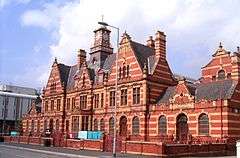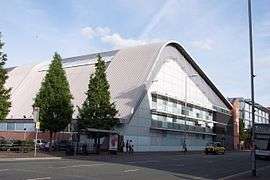Sport in Manchester
Manchester City and Manchester United are popular Premier League football clubs in Manchester, United's ground is in Old Trafford, and fixtures between the clubs are referred to as the Manchester Derby. Manchester United are historically the most successful football club in England with 66 elite honours won (including three European Cups).
Manchester City are the current Premier League Champions after retaining the title. The club have now won six domestic league titles. Under the management of Pep Guardiola in winning the Premier League in 2018 they became the only Premier League team to attain100 points in a single season. In 2019, they won four trophies, completing an unprecedented sweep of all domestic trophies in England and becoming the first English men's team to win the domestic treble.[1] Manchester City's revenue was the fifth highest of a football club in the world in the 2017–18 season at €527.7 million.[2][3] In 2018, Forbes estimated the club was the fifth most valuable in the world at $2.47 billion.[4] Manchester has hosted every major domestic, continental and international football competition, including the World Cup in 1966, the European Championship in 1996, Olympic Football in 2012, the 2003 UEFA Champions League Final, the 2008 UEFA Cup Final, 1893, 1911, 1915 and 1970 FA Cup Finals and 1977, 1978 and 1984 Football League Cup Final.
Lancashire County Cricket Club, formed in 1865 to replace Manchester Cricket Club, play at Old Trafford cricket ground.
Manchester has competed twice to host the Olympic Games, being beaten into fourth place by Atlanta in 1996 and coming third to Sydney in 2000. Manchester hosted the 2002 Commonwealth Games with many sporting facilities being built for them, including the City of Manchester Stadium, the Manchester Velodrome, the National Squash Centre and the Manchester Aquatics Centre
Football

Two Premier League football clubs, Manchester United and Manchester City, bear the city's name. Manchester City's home ground, the City of Manchester Stadium, is two miles outside Manchester city centre in east Manchester and Manchester United's, Old Trafford, the largest club football ground in the United Kingdom, on the west side two miles from the city centre.
Both City and United, as of 2001, had a highly localised fanbase with the majority of season ticket holding fans in the outer postal areas (BL, OL, SK, and WA) of Greater Manchester and within other counties of the North-west[5][6] Only a fraction of both clubs' respective season ticket subscribers came from within the central areas of the City of Manchester. The Manchester postal area includes the (strongly United supporting) City of Salford but also Prestwich and Whitefield in Bury (with one of the largest City supporters clubs). This research was conducted before City moved to the larger (48,000 capacity) City of Manchester Stadium, and before the expansion of United's Old Trafford stadium which now accommodates 76,000 meaning that the situation will have changed in the period since it was written.
Further research, published in 2008, has identified that the Manchester region is split with City's support predominantly coming in the south and east of Greater Manchester and the surrounding area and United's in the west.[7] United's nationwide and international support far exceeds that of City. Polls done in the local media suggest that the support of both clubs is split nearly 50/50 within the city and United edging out City with a small majority in all of Greater Manchester.
Aside from their two Premier League clubs, Manchester's earliest known association football club was Hulme Athenaeum, established in November 1863 with its first secretary being Jonathan Nall.[8][9] Manchester hosted the first meeting of representatives from the home nations football associations in 1886, and the International Football Association Board, which makes the rules for the game, was formed following this meeting. FIFA adopted the rules and regulations of football laid out by the IFAB when the organisation formed in 1904.[10] Manchester has remained a regular summit location for IFAB meetings since their formation.[11]
Manchester also hosts several other smaller semi-pro and amateur football clubs, the most notable of which is F.C. United of Manchester, who are based at Broadhurst Park in Moston, an area less than three miles north of the city centre. They play in the 6th tier of English football in the National League North after being promoted from NPL Premier Division.
The Manchester Football League is the official amateur football league of Manchester.
Athletics
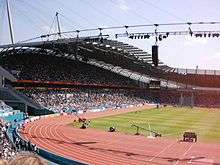
The city hosted the 2002 Commonwealth Games, and athletics events took place at the City of Manchester Stadium, which is now home to Manchester City and sometimes referred to as Eastlands. Next to Eastlands lies the Manchester Regional Arena, which has been used for British athletics trials and the annual Paralympic World Cup which has been held in Manchester since 2005.
The city also hosts the annual Great Manchester Run which has been hosted since 2003 and has become one of the most popular 10 km runs in the UK. In addition, the city also hosts the annual Great City Games, featuring a 110m sprint track on Deansgate in Manchester city centre. The world's top athletes are invited and in 2009 Usain Bolt took part.

Rugby League
Manchester is a city that is steeped in Rugby League tradition, although there hadn't been a professional Rugby League club based in Manchester since the Belle Vue Rangers disbanded as a club after the 1954–55 season.
Belle Vue Rangers who were Manchester's one and only professional Rugby League club started out as Broughton Rangers in 1877.
Although the club was founded in Salford, they moved to Belle Vue in 1933 and later became Belle Vue Rangers playing out of the Belle Vue Stadium. In 1935 Broughton Rangers RLFC bought Frank Whitcombe from the Welsh Rugby Union. He was paid £100 for his services along with two new suits.
Of his signing fee, £90 was to buy him out of the army, leaving him £10 to start a new life with his young family in Fallowfield. Broughton Rangers provided Frank with a job as zookeeper, at Belle Vue Zoological Gardens where Rangers played inside the speedway track. At this time Belle Vue was the premier leisure centre for the North West of England! The war years hit the club hard and due to financial hardships, the club's last season before they folded saw them finish next to bottom in the 1954/55 season.
Toronto Wolfpack, are a Canadian rugby league team who compete in the British second tier of rugby league. Their United Kingdom base is the Manchester Metropolitan University. In 2018 the Wolfpack and MMU jointly established a "player development pathway" in which the Wolfpack coach the MMU's university team, operate youth programs in both Manchester and Toronto, and encourage top young rugby talent from Toronto to pursue the sport in Manchester.[12]
Manchester Rangers are an amateur club with lofty ambitions of becoming a professional team. They have submitted a formal licence application to The RFL, and are based at the impressive Manchester Regional Arena which is part of the Etihad Campus .
Mancunians RL who are in the South of the city at the Hough End Centre.
All three teams deliver community programmes developing the sport across the city and wider area in an attempt to increase participation. Manchester Rangers have set up a Junior club - Belle Vue Bees ARLFC - which currently operates teams from U8s to U13s. In March 2015 Mancunians, who are backed by local entrepreneur Stefan Hopewell, announced their 20:20 Vision to have 1,000 participants across Manchester involved in the club by the year 2020.
Rugby union
Burnage Rugby Club play in National 3 and are based near Parrs Wood Entertainment Complex.
Manchester Rugby Club was founded as Manchester Football Club in 1860, eleven years before the formation of the Rugby Football Union. The club is one of the oldest rugby union clubs in the world, along with Blackheath Rugby Club and Liverpool St Helens F.C.. The club's ground is at Grove Park in Cheadle Hulme.[13] See main article: Manchester Rugby Club
Broughton Park Rugby Union F.C. is one of the oldest rugby union clubs in England and was established in 1882, just one year after the Lancashire County Rugby Union was founded and eleven years after the formation of the national Rugby Football Union. The club has had a number of different grounds in its time, mainly in the Salford/Prestwich area, but also in the south of Manchester. Since 2004, it has played at Hough End in Chorlton-cum-Hardy.[14]
Old Bedians Rugby (Union) Club was founded in 1954 as an Old Boys club for St Bedes College. Originally based in Chorlton, Old Bedians became one of two Didsbury rugby clubs in 1965. The club is on Millgate Lane in Didsbury Village.[15]
Didsbury Toc-H Rugby (Union) Club was founded in 1924 as "Toc H Manchester" in Victoria Park. After moving to various sites, the club arrived in Didsbury and in 1986 the name was changed to "Didsbury Toc-H" to identify with the clubhouse at Ford Lane in the Didsbury Village. "Toc-H" comes from a soldiers' club at Poperinghe in Flanders in the First World War. Soldiers and officers could get a respite from the battlefields. This place was named Talbot House in honour of a young lieutenant who was killed in action the year before. Signallers pronounced the letters 'T' as 'Toc' and 'H' as 'House'. When the rugby club was founded, Manchester soldiers called the new club as "Toc-H Manchester".[16]
Manchester also has other rugby union teams: the University of Manchester Rugby Club,[17] and Manchester Village Spartans RUFC
Swimming
Victoria Baths are in Chorlton-on-Medlock.[18]
Manchester has an Olympic-standard swimming pool in the Manchester Aquatics Centre, built for the 2002 Commonwealth Games, which is now part of the University of Manchester. The university runs the University of Manchester Swimming Club at the aquatics centre which was formed in 1885.[19]
Manchester has a number of swimming clubs. The City of Manchester Aquatic Swim Team based at the Aquatic Centre and they run academy sessions throughout Manchester.
Cricket
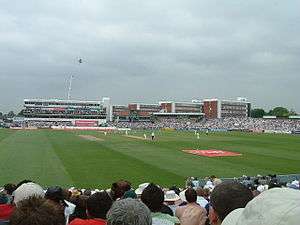
Old Trafford cricket ground, in the Metropolitan Borough of Trafford, was originally the home of Manchester Cricket Club, but became the home of Lancashire County Cricket Club in 1864 upon the club's formation. Built in 1856, the ground is on Talbot Road, Stretford.
A test match venue since 1884,[20] the 155-year-old ground is one of the most famous in world cricket, only The Oval in London can claim to have hosted an England test match earlier and the ground has hosted three World Cup semi-finals. The ground has seen many Ashes moments, including the 1902 Ashes test where Australia won by 3 runs (the closest test match winning margin and one which stood for nearly a century until 1993[21]), "Jim Laker Test" in July 1956 where the England spinner took 19 wickets,[22] Shane Warne's "Ball of the Century" against Mike Gatting and more recently the tense 2005 Ashes Test at Old Trafford when more than 20,000 fans had to be turned away due to tickets being sold out.[23]
Redevelopment plans have existed since the early 2000s (decade) as the cricket ground was in need of renovation, and even a move away to Sportcity nearby Manchester City F.C.'s City of Manchester Stadium was touted as a serious possibility.[24] Nearly £25m is expected to be invested in the redevelopments at Old Trafford.[20] Similar to its counterpart, one end of the Old Trafford cricket ground is called the Stretford End, the other end of the ground is called the Brian Statham end.
Lancashire hold the record for the most tournament wins in the Pro40 tournament (5 times) which ran from 1969 to 2009 and the Friends Provident Trophy (7 times) which ran from 1963 to 2009. Despite this strong one-day success, Lancashire have not won the top tier of the County Championship since 1934. In total they have won the County Championship on eight occasions in 1881, 1897, 1904, 1926, 1927, 1928, 1930 and 1934. However, they still remain one of the top county cricket clubs in the country and Lancashire maintains a healthy rivalry with Yorkshire, which is sometimes referred to as the Battle of the Roses (a pun on the actual War of the Roses which involved Lancashire and Yorkshire on opposing sides).
Cycling
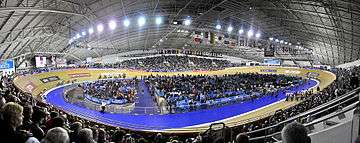
The National Cycling Centre includes a velodrome, BMX Arena and Mountainbike trials and is the home of British Cycling, UCI ProTeam Team Sky and Sky Track Cycling. The Manchester Velodrome is the UK's first purpose-built indoor Cycling Velodrome, which was primarily built for the 2002 Commonwealth Games. It is near the City of Manchester Stadium. British Cycling have stated their wish to remain based in Manchester, instead of moving to The London Velopark for the 2012 Summer Olympics, as development continues with the construction of a National BMX Arena next to British Cycling's base at the Manchester Velodrome.[25][26]
The Velodrome has become one of the fastest velodrome tracks in the world and its board tracks consist of 80 kilometres of 40mm Siberian pine on 380 trusses around the velodrome track. The Velodrome is covered by a 122-metre arched roof enabling unrestricted viewing for the spectators.[27] The Velodrome has hosted the UCI World Championships which is the set of world championship events for the various disciplines and distances in track cycling and are regulated by the Union Cycliste Internationale 3 times in 1996, 2000 and 2008 - no other venue has hosted more.
Fallowfield Stadium was an athletics stadium and velodrome in Fallowfield which opened in May 1892 as the home of Manchester Athletic Club after it was forced to move from its home next to Old Trafford Cricket Ground.[28] Fallowfield was most regularly used for cycling by the Manchester Wheelers' Club, who held their annual competition there until 1976.[28]
Speedway racing
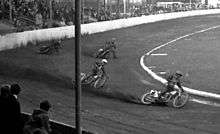
Motorcycle speedway racing has been staged at five venues in Manchester. The first events were staged at the greyhound stadium in Kirkmanshume Lane in 1928 and was known as Belle Vue Speedway. Speedway activities continued under the Belle Vue name at the purpose-built stadium in Hyde Road from 1929 to 1987, without any breaks even during the war years of 1939 - 1945, when the stadium was sold and redeveloped. Speedway racing returned to the greyhound stadium in Kirkmanshume Lane in 1988 and continued there until 2015. In 2016 the new £10m National Speedway Stadium with a 6,000 capacity was opened next door to the old greyhound stadium on Kirkmanshulme Lane. The speedway team are known as the Belle Vue Aces. Peter Craven, Ove Fundin, Ivan Mauger, Peter Collins and Jason Crump are amongst the riders who have won World Championships when riding for the Aces. The White City stadium was used in the pioneer days from 1928 to 1930 and a training track at Newton Heath operated in the early post war period.[29]
Basketball
Manchester has a strong history and modern day presence with basketball. The Manchester Giants compete in the nationwide, franchise based British Basketball League, and have done so since their rebirth in 2012. They play their home games at the Trafford Powerleague Arena and are coached by Manchester basketball legend Yorick Williams, who is in his second year in charge of the club.
The Manchester Magic were originally formed as the reserve side of the former Manchester Giants. Since the formal separation soon after, the Magic have flourished, and are current champions of the second tier English Basketball League Division 1, and play their home games at the Amaechi Basketball Centre, built with the support of former NBA player John Amaechi. Both clubs have strong youth development programs across Greater Manchester.
In 2016, Basketball England opened their new National Basketball Performance Centre in Manchester, comprising the best practice facilities available for the national teams, and retractable seating for 2000. The centre hosted the GB Women's Eurobasket qualifiers against Albania and Montenegro.
Other sports
Team games
The Manchester Titans are an American Football team in Manchester; their teams compete in the British American Football Association National Leagues, the largest American Football team in Great Britain, there have Adult Contact, Adult Flag, Women's Contact, Women's Flag, U19 Contact, two U17 contact, U17 flag and U12 flag teams. All teams compete in the highest available divisions, in 2017 the Adult Contact team won the Division 1 National Title, the Adult Flag team winning the MEC North Division, the U19 team finishing runners-up in the Britbowl Trophy and the U17 South team finishing as undefeated North Division Champions. The Titans play at the National Speedway Stadium at Belle Vue.
In 2010, Manchester Metropolitan University introduced an American Football team known as the MMU Eagles.
Manchester also has two ice hockey teams - Manchester Storm and Manchester Phoenix. The latter club is based in Deeside, North Wales. The city was previously home to the Manchester Storm ice hockey club who, in 1997, played in front of the largest audience ever to watch an ice hockey game in UK when 17,245 people saw the Storm defeat the Sheffield Steelers 6–2 at the MEN Arena. In 2015 Manchester Storm[30] returned to represent the City of Manchester in the 10-team Elite Ice Hockey League. The team plays out of the Altrincham Ice Dome in Altrincham.
Manchester also has two roller hockey teams, which have combined and reached the cup final against Bury St. Edmunds (at U13 level only).[31]
Manchester has a UKDBA Dodgeball team, the Manchester Bees Dodgeball Club. The club was formed in 2013 and in their first season won the Division 1 North UK Dodgeball League.[32]
Rowing
Manchester is home to four British Rowing affiliated clubs. Manchester University Boat Club and Trafford Rowing Club are located on the Bridgewater Canal in Sale, Greater Manchester, whilst the Salford Quays plays host to Agecroft Rowing Club along with Salford University Boat Club.
Miscellany
Belle Vue National Speedway Stadium in Gorton is home to the Belle Vue Aces speedway team.
Manchester is also home to two women's roller derby teams, the Rainy City Roller Derby and Manchester Roller Derby, the latter also has a men's and junior roller derby team. The sport continues to grow in the UK and Manchester and roller derby bouts held in Manchester regularly sell out as of 2011.[33][34]
Combat sports
Boxing is popular in Manchester. World champion boxers who come from Greater Manchester include WBA lightweight champion Anthony Crolla; IBF, WBA and WBO heavyweight champion Tyson Fury; and IBF and WBA super lightweight, and WBA welterweight champion Ricky Hatton.
Manchester has also hosted several events for World Wrestling Entertainment, as professional wrestling is not only popular in Manchester, but in the United Kingdom as a whole. Manchester is also the home of The British Bulldogs Davey Boy Smith and The Dynamite Kid.
Major sporting events hosted in Manchester
.jpg)
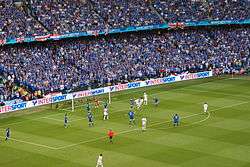
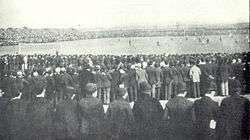
Below is a list of international sporting events that have been held in Manchester at various venues
Football
- International
- England national football team home stadium – 27 matches
- Old Trafford – 22 (1926–2006)
- Maine Road – 2 (1946–1949)
- City of Manchester Stadium – 2 (2004)
- Manchester Football Ground, Whalley Range – 1 (1885)
- 1966 FIFA World Cup – Old Trafford
- UEFA Euro 1996 – Old Trafford
- UEFA Women's Euro 2005 – City of Manchester Stadium
- 2012 Olympic football – Old Trafford
- UEFA Club Finals
- 2003 UEFA Champions League Final – Old Trafford
- 2008 UEFA Cup Final – City of Manchester Stadium
- Domestic Club Finals
- FA Cup Finals – 4 matches
- 1893 – Fallowfield Stadium
- 1911 replay – Old Trafford
- 1915 – Old Trafford
- 1970 replay – Old Trafford
- Football League Cup finals – 3 matches
- FA Cup semi-final venue – 46 semi-final matches
- Old Trafford – 23
- Maine Road – 18
- Fallowfield Stadium – 2
- Whalley Range - 2
- Hyde Road – 1
- FA Charity/Community Shield – 11
- Old Trafford – 6
- Maine Road – 5
Cricket
- International
- Cricket World Cup host city - 3
- Old Trafford Cricket Ground - 1975, 1979, 1983
(including two semi-finals in 1979 and 1983)
- Old Trafford Cricket Ground - 1975, 1979, 1983
- The Ashes host venue
- Old Trafford Cricket Ground: since 1882 (with the exception of the 2009 which was played in Cardiff, however Ashes cricket returned to Old Trafford in 2013[35])
Roller Derby
- 2018 Roller Derby World Cup - Event City
Rugby League
- International
- 2013 Rugby League World Cup Final venue - Old Trafford
- Domestic
- Super League Grand Final venue - Old Trafford
Snooker
- Snooker World Championship - 5
- Houldsworth Hall - 2 (1952, 1954)
- City Exhibition Hall - 1 (1973)
- Belle Vue - 1 (1974)
- Wythenshawe Forum - 1 (1976)
References
- Bullin, Matt (18 May 2019). "Man City win treble - how impressive is that achievement?". BBC Sport. Retrieved 18 May 2019.
- "Deloitte Football Money League 2018". Deloitte. 23 January 2018. Retrieved 23 January 2018.
- UK Business Insider
- Ozanian, Mike. "The World's Most Valuable Soccer Teams 2018". Forbes. Retrieved 12 June 2018.
- The other counties are Lancashire, Cheshire, Merseyside and Cumbria. Also studied were the Stadium Neighbourhoods, i.e. M14 postal district for City and M16 for United. The M postal area is much more extensive than the City of Manchester.
- Brown, Adam (2002). "Do You Come from Manchester?": a postcode analysis of the location of Manchester United and Manchester City season ticket holders, 2001. Manchester: Manchester Metropolitan University, Manchester Institute for Popular Culture. hdl:2173/12506.
- James, Gary (2008). Manchester - A Football History. Halifax: James Ward.
- James, Gary & Day, Dave (2014) The Emergence of an Association Football Culture in Manchester 1840–1884, Sport in History, Vol 34, Issue 1, pp.49-74 http://www.tandfonline.com/doi/abs/10.1080/17460263.2013.873075?src=recsys
- James, Gary Manchester's Footballing Pioneers, 1863–1904: A Collective Biography, The International Journal of the History of Sport (2015), Vol 32, no. 9, pp.1143-1159 http://www.tandfonline.com/doi/abs/10.1080/09523367.2015.1055727?src=recsys
- "The History of the Laws of the Game". FIFA.
- "Move to bring in HawkEye". Manchester Evening News. 5 March 2007.
- "Story, Manchester Metropolitan University".
- Manchester Rugby Club
- Broughton Park Rugby Union F.C.
- Old Bedians Rugby (Union) Club
- Didsbury Rugby (Union) Club
- The University of Manchester Rugby Club
- "Victoria Baths: a brief history". BBC.
- "The University of Manchester Swimming Club".
- Anon (9 May 2007). "Cricket ground makes 150 not out". BBC Online. Retrieved 23 May 2007.
- "Test matches - Smallest margin of victory (by runs)". stats.espncricinfo.com.
- "Classic Ashes clashes - 1956, Old Trafford". BBC. 2 November 2006.
- Anon (21 April 2006). "Ashes to Ashes". BBC Online. Retrieved 23 May 2007.
- "Lancashire consider leaving Old Trafford". Daily Telegraph. 4 November 2003.
- "British Cycling will not relocate to London after Olympics". morethanthegames.co.uk. 20 November 2009.
- "Manchester still our base - Brailsford". Sporting Life. February 2011.
- "Manchester Velodrome - About Us". Manchester Velodrome. Archived from the original on 17 July 2012.
- Inglis, Simon (2004). Played in Manchester. Swindon: English Heritage. p. 62. ISBN 978-1-873592-78-6.
- "History of The White City Track", www.manchesterhistory.net, retrieved 15 July 2007.
- "Manchester Storm – the Official Website of Manchester Storm".
- National Cup Finals & AGM venues in Manchester. URL accessed 11 November 2007.
- UKDBA NDL1 League results. URL accessed 14 April 2014.
- "Roller derby makes a play for Manchester sport fans". BBC. 16 June 2011.
Spurred on by the sell-out, Ms O'Connor says Manchester is coming round to the sport "slowly but surely and soon we'll have the whole city".
- Glendinning, Amy (3 February 2011). "Roll with it... after all roller derby is a wonderbrawl". Manchester Evening News.
- "Old Trafford's Ashes target". Manchester Evening News. 6 May 2009.

